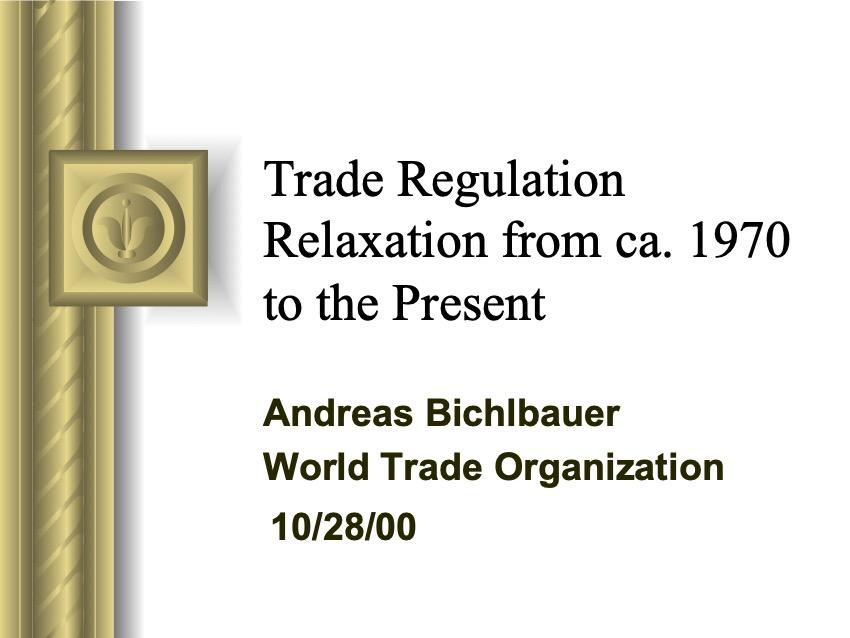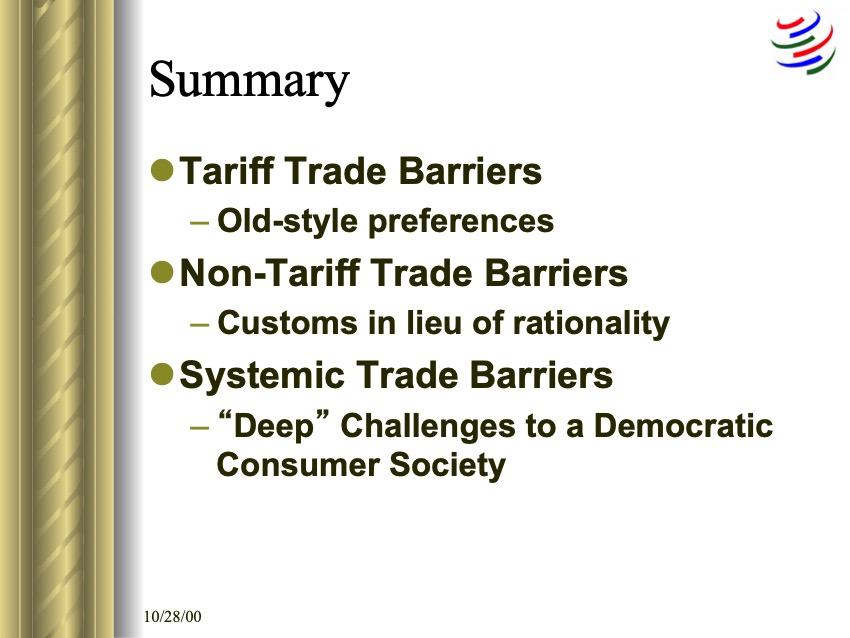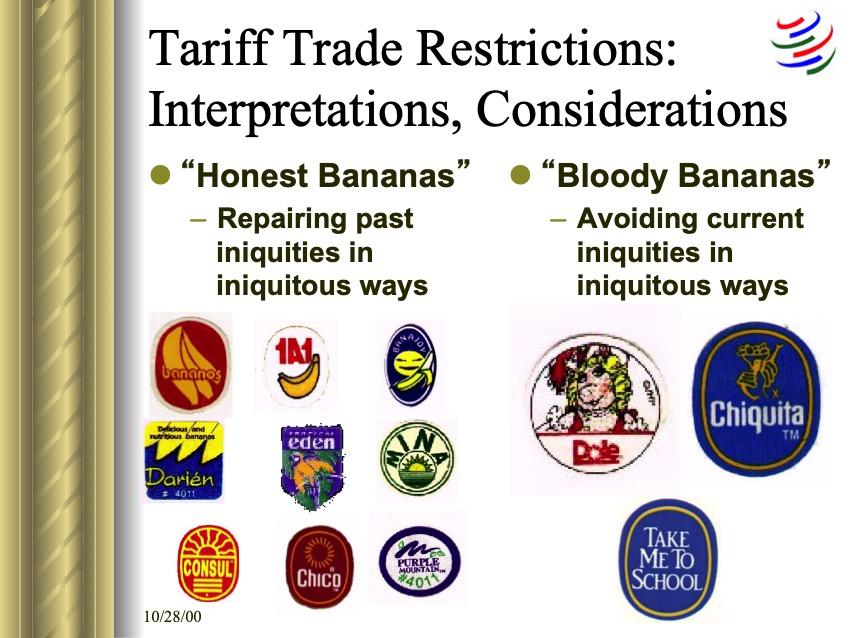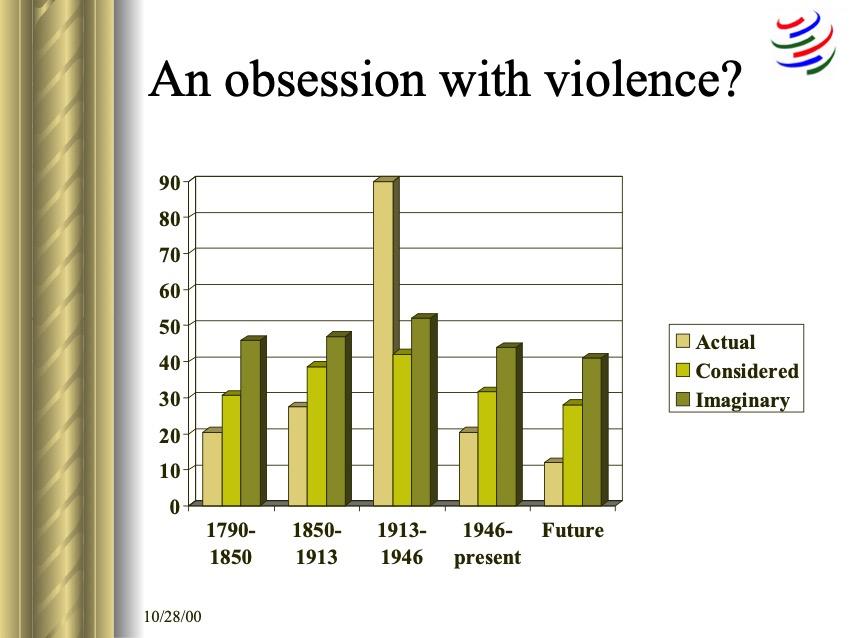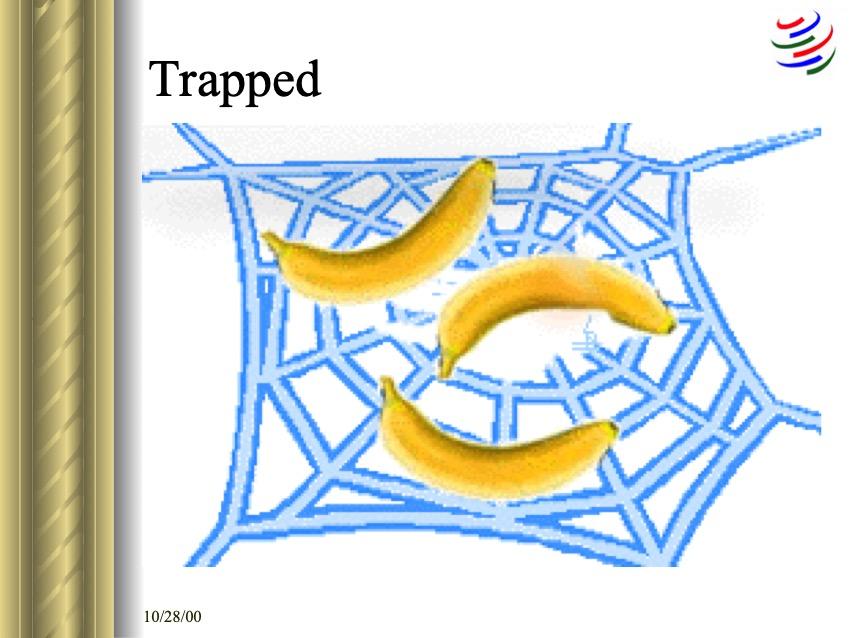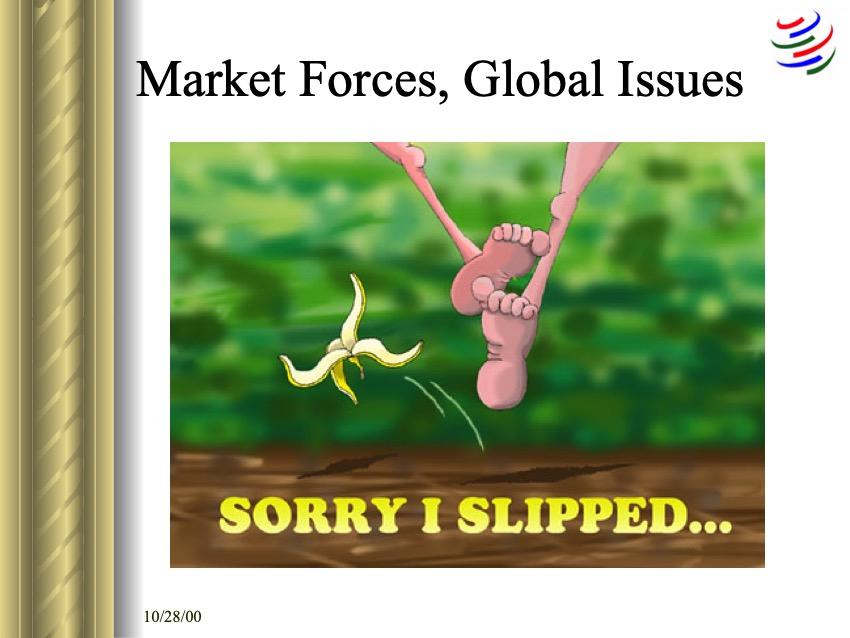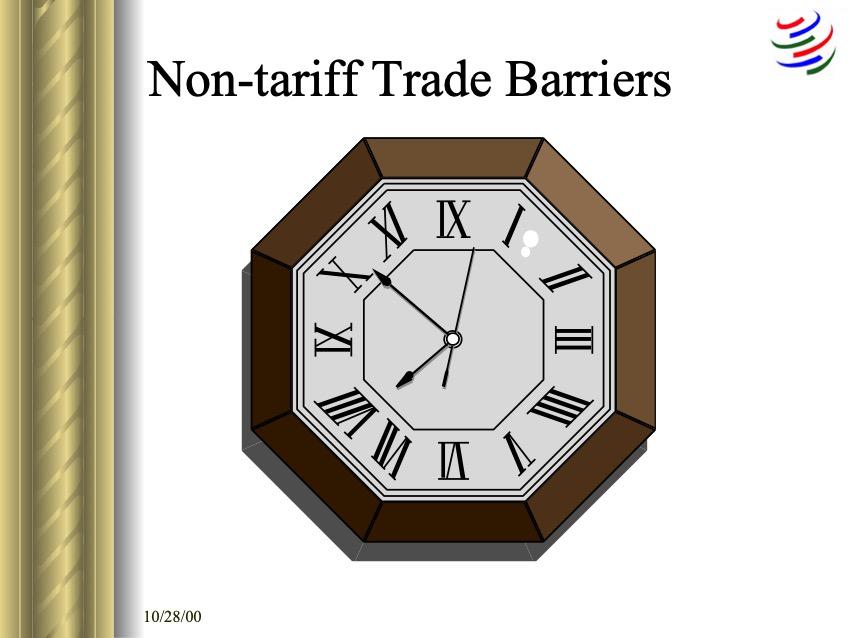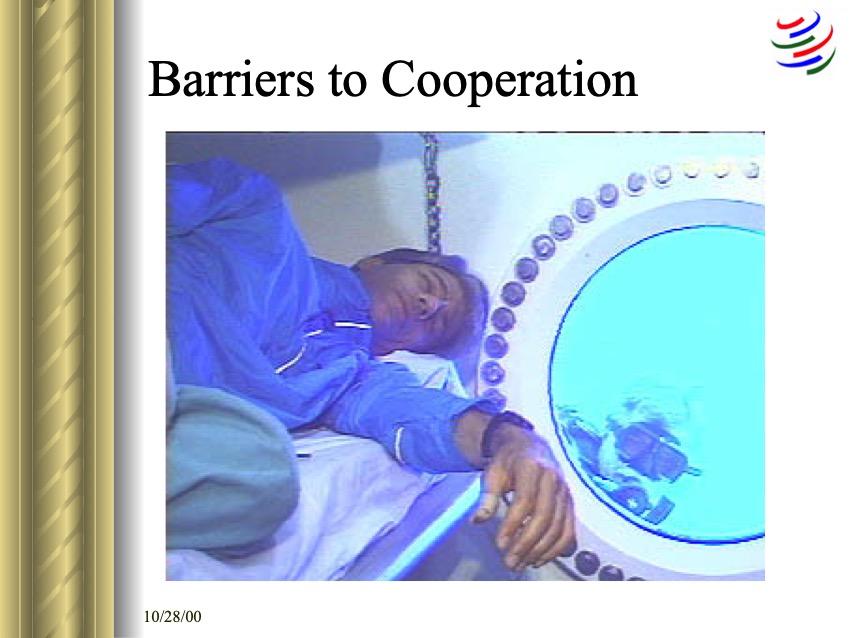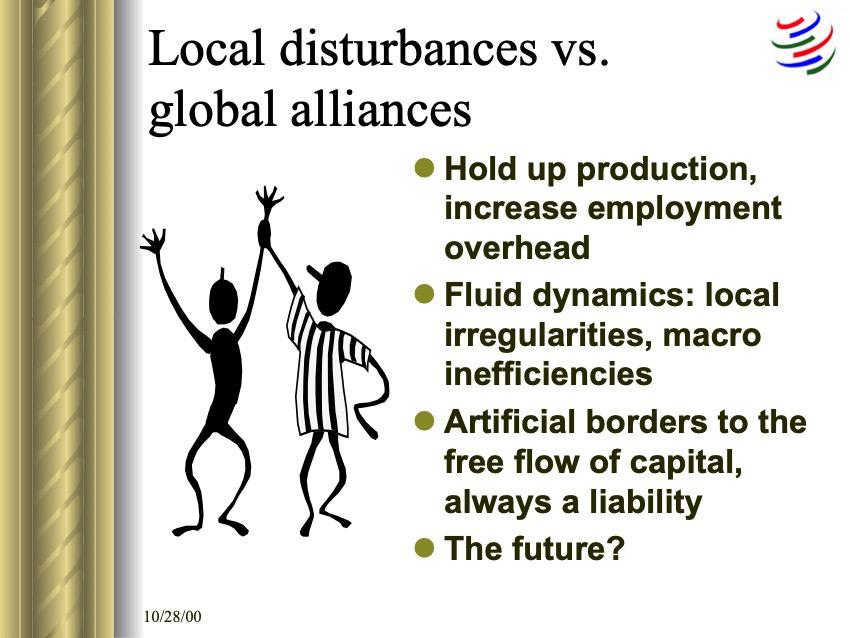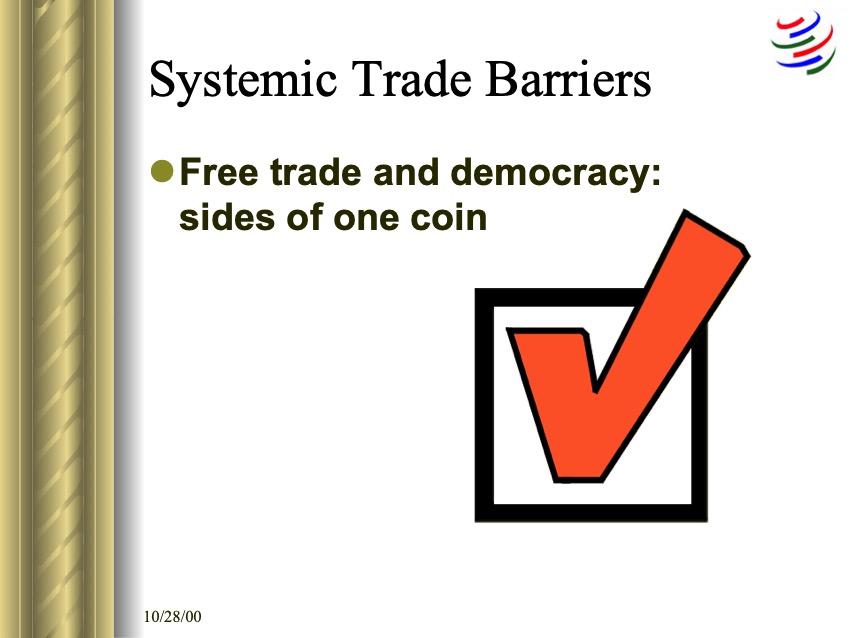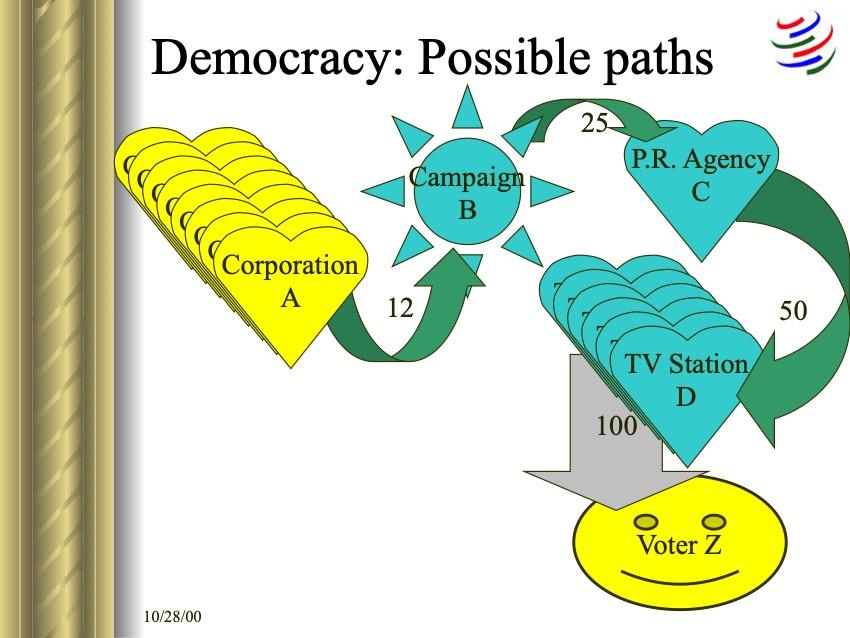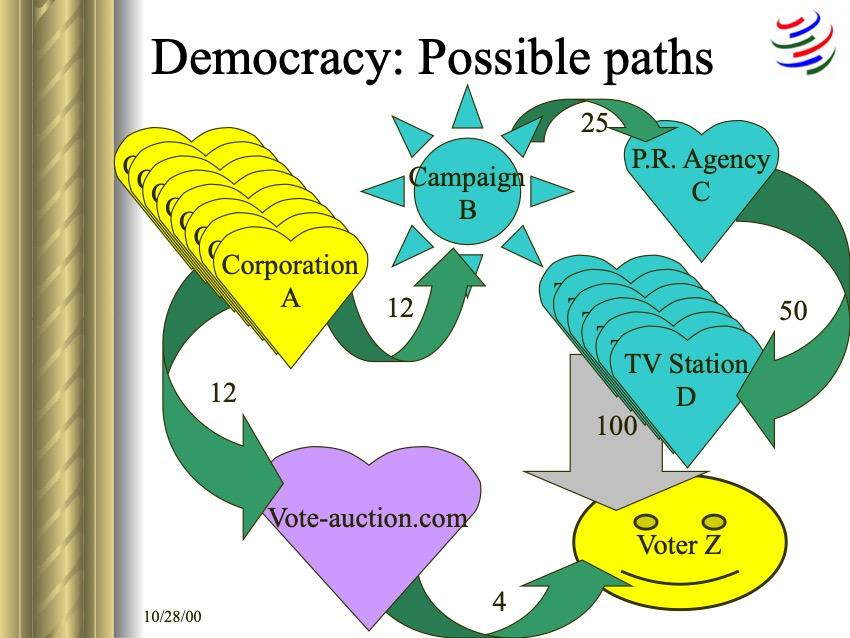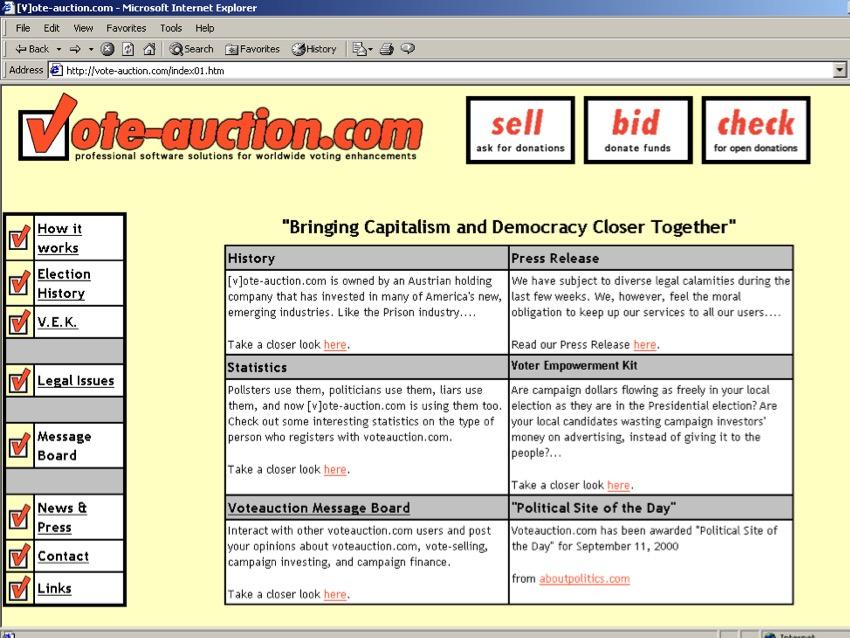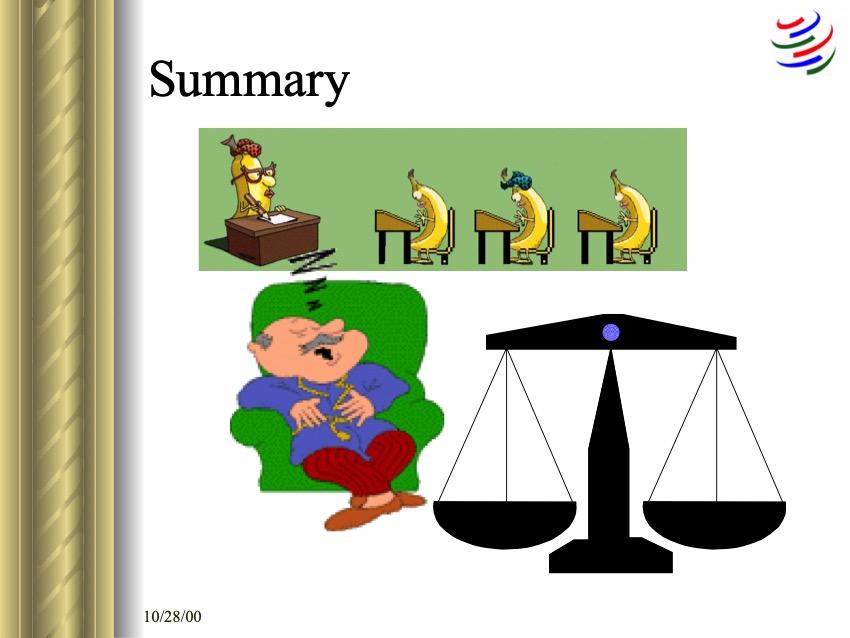[This was the first Yes Men lecture, delivered by one "Andreas Bichlbauer" (actually "Andy Bichlbaum"), on October 27, 2000 at the Center for International Legal Studies (CILS) in Salzburg, Austria. For details visit the project page.]
Thank you very much. It’s a great pleasure to be here, in Salzburg. I’d like to thank the organizers, the other hosts, and everybody who’s taking the time to listen, even for a while, to the messages of the WTO.
We'll be talking for the next twenty minutes about impediments to free trade, and about the various barriers that have been erected against trade over the years—in official, less-official, and completely non-official ways. These barriers, of course, affect not only all of you, but of course all of the world. They are crucial for progress and development and so on and so forth.
Our primary focus to begin with will be on a form of restriction simply called Tariff Trade Barriers: ordinary economic impediments to free trade, established by governments to protect their citizenries against the rational progression of market forces. Everybody knows these, these are the best known.
Some of the others are not as well understood. There are Non-Tariff Trade Barriers, which means anything that is not a tariff but does inhibit trade. These can include legislation—e.g. laws banning the import of tuna caught in nets that kill dolphins, or prohibiting the import of food with carcinogenic pesticide residues, or banning clothes made with slave labor; they can also include ordinary customs and culture, which, like laws, impose arbitrary limits to the functioning of the economy.
Finally we have Systemic Trade Barriers, which are the most insidious form of free-trade barrier. These are deep barriers, at the level of systems and structures, at the very core of the governments of most countries today.
In all three cases, we’ll be talking not just about problems, but on solutions as well: from past solutions that have worked, or nearly worked, to future solutions that we can only imagine.
Now Tariff Trade Barriers are what countries have done at various times to isolate the conditions of economic development on behalf of the well-being of their citizens, or of the citizens of other countries for which they feel some sense of responsibility for whatever historical reason.
And the most notorious case, that everyone associates with free trade in many parts of the world, especially among free-trade-skeptical sectors of the population, is the so-called "honest bananas" case.
You all know the joke: “It isn’t possible to kill a person by hitting that person over the head with a banana. It is, however, possible to kill a person over bananas by hitting that person over the head with a machete.”
What does this mean?
There's a certain amount of violence in the world—past, present, and future. The EU, in trying to control its bananas, is actually trying to control the violence done in the distant past by European member states against their former colonies. The EU has done this by paying more for bananas from these colonies than they have to! More, for example, than they'd pay for bananas from Central America, produced on much larger farms, using much more modern enforcement techniques.
Conversely, the EU is trying to control the bananas of others, if you will. Yes, violence has been committed in Central America on behalf of banana concerns like Dole and Chiquita. Yes, wages do average around five dollars per day, with next to no union membership, child labor laws, or worker health standards. But by keeping "violent bananas" out of Europe, the EU is endangering competition—and thus the whole edifice of modernity.
The European and U.S. markets both suffer, as does the Central American "political market," if you will. We have an obsession with violence interfering with the rational functioning of the marketplace.
Just to describe this irrational obsession with violence in a little more detail, here are some figures, from a study undertaken by Hill and Knowlton, of perceptions of violence from 1790 to the present.
In this study, U.S. consumers were asked how much violence they imagined there was in various periods. The chart shows this as “imaginary” violence. For comparison, it also shows actual violence—i.e. violence by people against people resulting in death.
From 1790 to 1913, as you can see, there’s a certain amount of actual violence, on the left, but people imagine a great deal more. Then, from 1913 to 1946, you have two World Wars, a great deal of actual violence: it’s pretty much off the chart. Yet the imagination cannot keep up. Finally, actual violence goes down, yet people still think there’s a whole lot of violence. In the future, this trend is sure to continue.
Clearly, violence perceptions have nothing to do with violence. For sanity to reign, we must enforce a rational, economics-based approach to violence, an approach in which human emotions can have no place.
Otherwise we are certain to be faced with a situation like in that Jerry Lewis movie, when there's that domino effect—the person slips on the banana. Behind that person is another person, and behind that another—and behind that one a table. On the table, there could well be a computer—perhaps a server maintaining the website of Chiquita. You can see the progression. Any matter can lead to any other matter. When the server goes down they lose a day's business receipts, the market value takes a tumble, and it takes weeks or even months to recover.
To put it more crassly: if we let even one single country pay more for one single banana, it could open the floodgates—like a wine-drinker becoming a pothead and then graduating to heroin or becoming a coke fiend. When you see your relatives wandering toward you like zombies, you’ll sure know you slipped on a banana peel!
We must take our bananas seriously.
Non-tariff trade barriers are a little more complicated. They can include everything from environmental legislation to local mores and customs, which can, every bit as much as government, restrict the free flow of goods and money, imposing limits to the proper functioning of economic forces.
Not long ago KLM, which is based in Holland, and Alitalia, which is Italian, tried to merge. And the actual prime variable in this instance was sleep.
In Holland and in most northern countries, you see, people sleep at night, and take at most a small Mittagsschlaf in the daytime. There’s very little distraction from the work environment. There’s a fairly regular approach to comings and goings, especially as concerns sleep.
In Italy, on the other hand, you have a totally different situation, in which sleep is done during the day as much as at night, almost. Furthermore you have lunches that can last for an hour or two; you can have a nap after that; there’s conviviality, hilarity; there’s drinking a little too much wine, there’s digging in to saltimbocca romana and all of these delightful dishes that end up basically getting in the way of work.
Because of these problems, the merger fails and nothing comes out of it. An opportunity at transnationalism is swept under the rug.
And this is particularly poignant for us at the WTO, for “alliance” is the WTO’s middle name. The WTO sprang out of the GATT, which itself was formed after WWII in an attempt to prevent future wars. The idea—that we still like to communicate—is that patrons rarely kill clients, that business allies in general rarely kill one another.
There are exceptions, of course—WWI, WWII, the Rwandan genocide, Iraq, etc. But the theory held true in at least one large case—the entire 19th century—when free trade helped to prevent business partners from attacking each other. For 100 years, the sort of trade liberties the WTO enforces today helped maintain peace between the wealthy, powerful countries of Europe, and had entirely salutary effects, with the exceptions of colonialism and the slave trade.
So when mergers are threatened by local peculiarities—when customs impede the forced march of commerce—there’s no way to tell what can happen in regards to the full array of transnational interests, and in consequence to the stability of postwar peace.
We’re faced with a situation in which everything is quite serious. Any artificial impediment to the free flow of capital is a dangerous liability. And what is in the future of this? We don’t know. What is the potential solution when not only governments but local variations in culture conspire to impede the free flow of progress?
Mystery.
Finally, I’d like to talk about the most mysterious, but strangely the most likely to be solved of all three types of trade barriers: Systemic Trade Barriers.
Now we all know what democracy is: it's the participation of the greatest number of consumers possible in the direct functioning of the government and the economy.
It follows almost necessarily that free trade is the other side of the democracy coin—and thus consumerism is the ultimate form of democracy and citizenry in the modern world.
Now consumer choice is, of course, an essential component of the democratic process—but this role is seldom acknowledged, and is always inefficient. This is because of the vast range of peculiarities that government assumes in today's democracies, the peculiar manifestations of popular power: parliaments, congresses, etc.
So much variety, so much complexity, can only spell inefficiency—which is sometimes lethal to the idea of a consumer democracy.
In many cases, fortunately, we can look to the private sector to see emerging solutions to the vast inefficiencies of so-called democratic institutions.
One possible solution, currently being tested in the field of American politics, is to streamline the grotesquely inefficient system of elections—elections being, of course, at the core of a consumer democracy.
Let us first look at elections as they currently unroll, with all their inefficiencies in place.
At the top, we have a number of corporations, let's call them Corporation A. From each corporation, involving the work of about 12 employees per corporation, goes a great deal of money to a campaign—let's call it Campaign B. This can be for any elected official, including the President. From the campaign—involving the work of a great number of workers—goes a great deal of money to a P.R. agency like Hill & Knowlton—let's call it C. From the P.R. agency, with the help of about 50 employees on full-time salary, goes a great deal of money to T.V. stations, who, finally, relay the information to the consumer—with no transfer of money, of course.
And of course the irony of this: in order to generate all the money that it takes to fuel this chain, at the start of the chain you have all the workers of the corporations who are also the citizens and the voters at the end of the chain. So it’s a system that just feeds itself and has very little actual utility.
Now on the other hand, another model: in this case you have the corporations paying, with about the same number of people involved, one entity: Voteauction.com. Voteauction.com, in turn, employs only four people to transmit not merely information and paid advertisements, but actual money, directly to the consuming voter.
Vote-auction.com is a system that permits voters to voluntarily auction their votes to the highest bidder. It’s a forum for people to voluntarily offer their votes, when they don’t have a strong affinity for either candidate. It works to streamline the entire process, and as in all market systems, everything works out to the benefit of the consumers, as well as the originating corporations.
So to sum up: we've talked about barriers to free trade past, present, and future. And those barriers that we'd like to see consigned to the past for good are the tariff-based problems—bananas.
Requiring a bit more finesse and a little more care in dealing with people-based opposition is the second type—non-tariff trade barriers, still important problems in places in Europe and elsewhere. Different working habits, siestas, etc.: all of this has to be standardized, and this is a very long process.
And finally we have, most complicated of all, systemic trade barriers, which are problems at the core of modern democracies, and yet which could be solved by allowing the free functioning of a very competent marketplace. A free marketplace. A liberated marketplace. And I like markets, I think this is what markets are for.
Thank you.
MODERATOR: As promised, at this point, we're going to open the floor to any discussion.
[Paul Brinkman, J.D., a conference participant, raises his hand]
PAUL BRINKMAN: There’s this growing cadre of protestors. What’s disturbing to me, as a person involved day to day in international trade, and the lessening of restrictions, is that I don’t think these people understand what they are protesting. I don’t see a dialog coming from the WTO Secretariat or the member countries. What are you guys doing at the WTO to address these people because these are just people who are energetic and want something to protest at least that’s how I see most of them.
"ANDREAS BICHLBAUER": Yes, in fact, I think you are completely right as we do at the WTO, most of us agree with your perspective. What is the WTO doing about this? The WTO is so loaded with hatred, er, the other way around, the name of the WTO is so loaded that you can’t really project a friendly image if you’re the WTO to many sectors of the population. It’s the same problems faced by Chevron and other corporations. What we’re looking to do is to learn from the corporate example…as usual. And perform grassroots actions, grassroots dissemination of information, without identifying ourselves in the equation so much, so as to provide a more objective view of our activities.
[Note: six months after Bichlbauer’s “outrageous” answer, the WTO was discovered to be secretly marketing its ideas to teenagers.]
